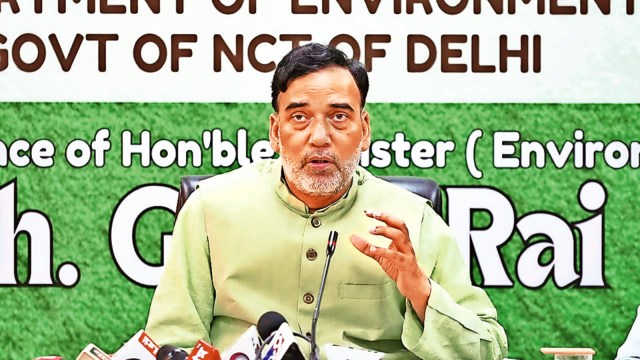Unprecedented rains, heatwaves call for change in action plan on climate change: Delhi Minister Gopal Rai
The revised state action plan will be submitted to the Centre, after which a detailed winter action plan to combat air pollution will be prepared.
 Environment Minister Rai on Wednesday. Express photo
Environment Minister Rai on Wednesday. Express photoUnprecedented rains and heatwaves, among other pressing concerns, call for a change in the city’s action plan on climate change that was earlier finalised in 2019, said Delhi Environment Minister Gopal Rai Wednesday.
Among the proposals is to create a green belt across the Yamuna floodplains as a barrier between the river and the city’s urban areas.
The revised state action plan will be submitted to the Centre, after which a detailed winter action plan to combat air pollution will be prepared.
Raising concerns over the direct impact of climate change on the people of Delhi by drawing examples of heatwaves and unprecedented rains, Rai explained the importance of the measure after a round table conference on Wednesday. The conference was attended by officials from 40 departments from both the state and the Centre along with experts and was aimed at overhauling the existing climate policy of 2019.
The draft comprises mitigation measures for seven sectors.
“The policy focuses on seven sectors… the energy and power sector; urban planning in which waste management will be in focus,” he said.
“Third is water management. Fourth is forest and biodiversity, which would focus on ways to increase green belt. Fifth is to control transport which is affecting climate change. Agriculture management and horticulture as well as health are also featured,” Rai added.
The mitigation measures proposed under the Energy and Power sector include renewable and clean energy initiatives such as boosting solar power generation and setting up Waste-to-Energy (WTE) plants. It has also been proposed that 8,000 public charging points and 30,000 private charging points should be set up by 2026. All 61 bus depots are to be electrified by 2024-25; so far 16 depots have achieved this.
For the urban planning sector, the focus has been put on mitigating waste management. The steps planned to be taken for this include establishing WTE plants of 6,000 tonne per day capacity. This includes ensuring 100% waste segregation across all urban local bodies at the source by December 2024. Targets have also been set to achieve multiple processing of e-waste, processing of biomedical as well as plastic waste, and construction and demolition waste management.
Mitigation measures for the health sector have been proposed following the National Programme on Climate Change and Human Health. The key takeaways include setting up an Environmental Health Cell.







